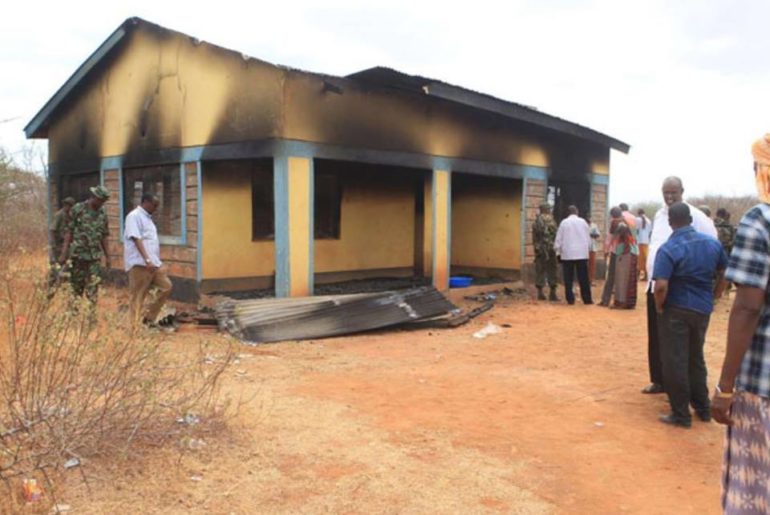
Two Christian school teachers were killed in an attack by suspected Al-Shabaab militants in Kenya’s Mandera County, near the Somali border, last week.
Philip Okumu, 26, and Daniel Wekesa 39, died on Wednesday (10 October) after assailants raided the house for non-local teachers in Arabia Boys Secondary School, about one kilometre from the Kenya-Somali border.
According to Olaka Kutswa, the Mandera County Commissioner, over 20 assailants stormed the school at around 1am, outnumbering the four Kenya Police Reservists (KPR) on guard. They threw an explosive device into one of the rooms of the house where the school’s four non-local teachers stayed, setting it on fire, he said in a statement.
Both Okumu and Wekesa were shot when they tried to escape the fire.
Police said yesterday (15 October) that the attack had been planned by Hassan Hodey, a Somali national from the Damasa area, and said Al-Shabaab appeared to be preparing further attacks in the Kenya–Somalia border region.
The school’s other two non-local teachers, Elijah Nderitu and Kelvin Lomusi, survived the attack.
“All the other teachers, students, and workers are safe, and the County Security Committee has held several meetings with the County Education Board to arrange for necessary psychological support and counselling services for them,” said Kutswa.
Lomusi told Kenya’s The Citizen TV that the attackers had forced open the door to his room before one of them entered to check if there were any survivors. He then fled when a mattress caught fire.
“I was hiding between the bed and the wall,” said Lomusi, who sustained some burns on his face after the mattress caught fire. “Going out was not a simple step to take, since I feared they may still be around.”
“After witnessing the attack and the killing of my colleagues, I can no longer endure working there anymore,” Elijah Nderitu, the other survivor, told the TV station.
Transfer of all non-local teachers
The teachers, originally from western Kenya, were fairly new in the area. Okumu had worked in the school since 2016, while Wekesa joined in 2017. Both men were Christians, Fr. Nicholas Mutua, a Catholic priest, told World Watch Monitor.
The attack comes as fear is growing that Al-Shabaab, the Somalia-based east African affiliate of Al-Qaeda, is targeting education, and its proponents, in the predominantly Muslim region.
Following an attack by the group on Garissa University College in April 2015, in which gunmen killed 149 students, Kenya’s president Uhuru Kenyatta suggested the attacks were an attempt by the militants to create a caliphate in Somalia and north-eastern Kenya. Observers say that wiping out non-locals from the Muslim-majority region would fit that strategy.
In February, the government ordered the transfer of all non-local teachers from regions near the border with Somalia after two other non-Muslim teachers and the fiancée of one of them were killed in neighbouring Wajir County.
Following those killings the Teacher Service Commission (TSC) transferred 108 teachers (both Primary and Secondary) away from the volatile border areas. An estimated 18, however, chose to remain in the region.
Although the transfers were criticised by local political leaders, a June 2018 report by the TSC showed that non-local teachers were frequently harassed on the basis of their religion, race, culture, dress and language. Female teachers were being forced to wear deras (a large dress) and the hijab (veil), and both male and female teachers were frequently attacked by students.
Regular targets
Fr. Mutua, who serves Mandera County from Garissa town, told World Watch Monitor that Christian teachers working in Kenya’s volatile north and north-east are regular targets.
While Al-Shabaab has increased attacks in Kenya, especially since the country sent troops to join the African Union Mission in Somalia (AMISOM), some observers fear that local politics and power struggles among local clan leaders may also be fuelling some of the attacks.
According to Fr. Mutua, the attacks appear well-planned because non-local citizens are harmed or killed, while the local Muslim teachers and other workers are left unscathed.
In October 2016 Al-Shabaab militants carried out an attack in Mandera town, killing Christian Kenyans who were not from the local area.
“We have been saying that while the actual attacks are carried out by Al-Shabaab militants, local collaborations should not be ignored,” said the priest.
“We have observed that the killing of the teachers tends to occur as national examinations approach. The same trend is repeated when results are released. We need to investigate if the attacks are related to examinations and the control of results,” he said, adding that local people fear that non-locals may reveal secrets related to cheating in the exams.
However, Fr. Alfred Murithi, a Catholic priest in Wajir town, told World Watch Monitor in February that Christian teachers say they face many other challenges, such as discrimination by the local communities along religious lines, since they are not Muslims.
Wajir, like Mandera and other counties in the region, is predominantly Muslim, but in both public and private schools, the majority of teachers (roughly estimated at 60 per cent) are Christians.